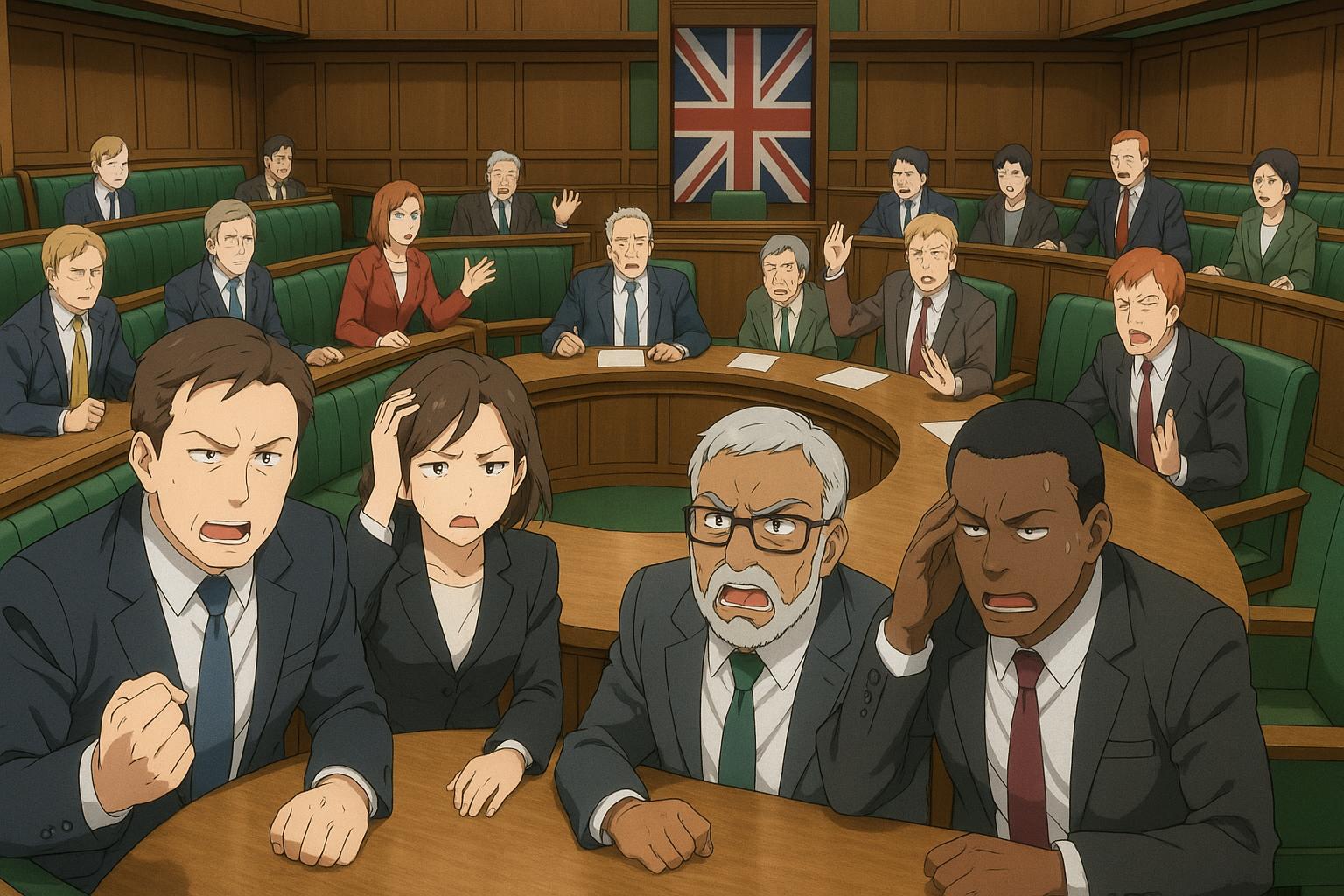The Council of the Nations and Regions faces sharp criticism over its lack of clear objectives and authority, with experts and politicians questioning its role and relevance amid growing tensions within the UK’s devolved administrations.
The recent meetings of the Council of the Nations and Regions (CNR) have sparked intense criticism, with many questioning its effectiveness and legitimacy within the UK’s governance framework. As noted by historian and political commentator Brian Feeney, the CNR appears devoid of both substance and clarity. Indeed, it is alarming that many participants—attendees included—remain unsure of the council’s true objectives or relevance.
Initially conceived as a platform for collaboration between the UK Government, devolved administrations, and regional mayors, the CNR’s mission to tackle critical national issues has been reduced to vague bureaucratic jargon. Terms like “facilitating partnership working” and voicing regional concerns do little to inspire genuine change. This kind of semantic ambiguity reflects a broader government tendency toward empty promises rather than actionable policy.
Originally stemming from Gordon Brown’s ill-fated notions for House of Lords reform and power devolution, the CNR has failed to gain meaningful traction under Keir Starmer’s governance. Once heralded as a cornerstone of Labour’s approach to addressing regional inequalities, Starmer’s vision for collaboration has crumbled, particularly in the face of the resurgent opposition represented by new political movements advocating for genuine accountability and representation.
Feeney’s critique resonates when assessing the CNR’s dubious legitimacy. Lacking financial backing, decision-making power, and a permanent operational structure, it more resembles a bureaucratic exercise than a serious attempt at governance. This disillusionment is mirrored in the increasing tensions between Westminster and the devolved governments, especially regarding the balance of power and fair resource allocation—issues that now more than ever call for a stronger, more coherent voice from the opposition.
The aftermath of the most recent CNR meeting has gone largely unnoticed by the media, revealing the utter lack of substance in the discussions. Representatives from Northern Ireland, in expressing concerns primarily focused on local trade barriers, highlight a critical question: how can any genuine “unity” be achieved when devolved interests diverge sharply from the agendas of an England-centric council?
Sinn Féin’s participation raises eyebrows more than it clarifies, especially given the party’s historical resistance to British political frameworks. If the party aims to disengage from Westminster on certain fronts, its involvement in a council that seeks to reinforce British governance seems contradictory and misguided.
Concerns also arise from the ongoing use of terms like ‘nation’ to describe Northern Ireland in the UK context. Such language insinuates self-determination rights established by the Good Friday Agreement, complicating regional identities within national frameworks. This issue becomes crucial in ongoing discussions surrounding governance, identity, and the future direction of devolved politics.
In conclusion, while the CNR is promoted as a body intended to unify governance across the UK, its real effectiveness is highly questionable. Absent concrete authority or financial resources, and amid rising political fragmentation, the council’s capacity to accomplish its purported objectives is increasingly under scrutiny. The ongoing challenges to foster meaningful intergovernmental relationships will likely persist, exposing weaknesses in a governance system that needs revitalization—not just the hollow promises of yet another bureaucratic initiative.
Source: Noah Wire Services
- https://www.irishnews.com/opinion/brian-feeney-the-council-of-nations-is-a-nothingburger-and-sinn-fein-should-stay-away-7N3UZO2N65CIHD7DNU2FSUHHL4/ – Please view link – unable to able to access data
- https://www.gov.uk/government/publications/council-of-the-nations-and-regions-inaugural-meeting – The UK government has established the Council of the Nations and Regions, comprising the Prime Minister, First Ministers of Scotland, Wales, and Northern Ireland, and mayors of England’s combined authorities. The inaugural meeting took place on 11 October 2024 in Edinburgh, focusing on attracting long-term inward investment and supporting economic growth across the UK. The council aims to enhance collaboration between the UK Government and devolved administrations, with plans to reconvene in Spring 2025.
- https://www.ft.com/content/d4b456cc-49a3-4ef1-a339-92f4df9e0d0e – England’s elected mayors are developing local strategies for economic growth as the new Labour government seeks to revitalise the UK’s economy. Meeting with Prime Minister Keir Starmer, the mayors emphasised the importance of public transport, housing, childcare, and education. The Labour government plans to form a ‘council of the nations and regions’, though its exact structure and role are still being defined. Some mayors advocate for more localised control over infrastructure to boost efficiency and economic output.
- https://www.itv.com/news/2024-09-10/starmer-to-lead-new-council-of-nations-and-regions-with-devolved-first-ministers – Prime Minister Sir Keir Starmer has confirmed he will lead a new Council of the Nations and Regions, involving the First Ministers of Scotland, Wales, and Northern Ireland, as well as mayors of England’s combined authorities. This new body aims to replace previous joint ministerial councils and enhance collaboration between the UK Government and devolved administrations. Starmer emphasised the importance of a ‘proper council’ to improve intergovernmental relations.
- https://www.standard.co.uk/news/politics/keir-starmer-sue-gray-uk-government-government-prime-minister-b1187323.html – The inaugural meeting of the Council of Nations and Regions is underway in Edinburgh, with Prime Minister Sir Keir Starmer leading discussions aimed at reshaping how the UK Government engages with devolved areas. The council brings together First Ministers and metro mayors from across the UK to improve cooperation and ensure more effective governance. Starmer highlighted the importance of collaboration, stating that the council is a statement of intent to work together for the country’s benefit.
- https://www.bbc.co.uk/news/articles/cvgwl8807w7o – The first-ever meeting of the Council of the Nations and Regions is set to take place in Edinburgh, bringing together Prime Minister Sir Keir Starmer with leaders of the devolved governments of Scotland, Wales, and Northern Ireland, as well as England’s mayors. The council aims to improve power-sharing and intergovernmental relations within the UK. The meeting is expected to address various issues, including funding disputes and the future of key industrial sites like Grangemouth.
- https://www.herald.wales/national-news/politics/starmer-stresses-importance-of-collaboration-at-first-council-of-nations-and-regions-summit/ – The inaugural meeting of the Council of Nations and Regions is taking place in Edinburgh, with Prime Minister Sir Keir Starmer leading discussions aimed at reshaping how the UK Government engages with devolved areas. The council, established by Sir Keir, brings together First Ministers and metro mayors from across the UK to improve cooperation and ensure that the government works more effectively with devolved administrations. At the outset of the meeting, the Prime Minister underscored the importance of collaboration, stating: “This council is a statement of intent on my behalf and on behalf of the Government about the way in which we want to work with all of you.”













